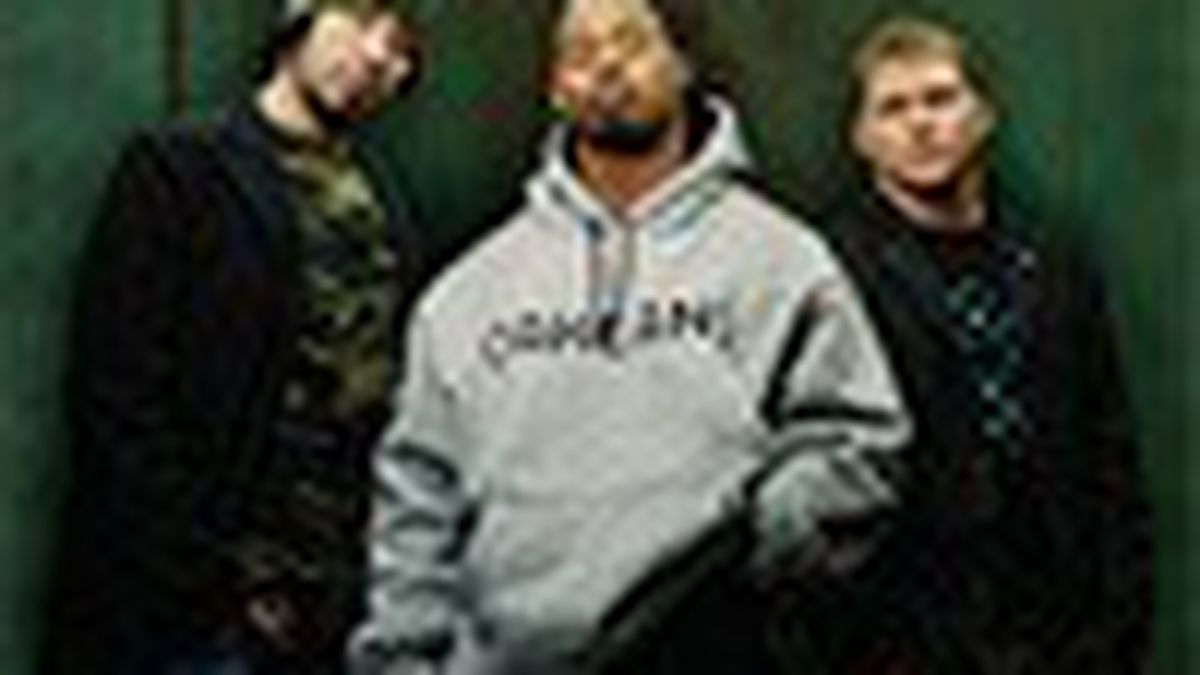Going from rags to riches is an understatement for local hip-hop group Flipsyde. Conceived in 2000, when a West Oakland screenwriter started rapping over the plaintive guitar melodies of an Alabama-raised singer-songwriter, the group initially had no commercial pretensions. Seven years later, the scrappy Oakland band has sold more than three hundred thousand copies of its debut album We the People, and is known for the hit “Someday,” NBC’s official song of the 2006 Winter Olympics. Currently finishing their second album, Flipsyde’s members now hope to repeat the startling success of their debut, while earning some long-overdue local respect and radio airplay that belies their mainstream success.
The band took shape in autumn 2004, when screenwriter Jinho “Piper” Ferreira and Alabama’s Steve Knight added Dave Lopez — a Chilean-born, self-taught flamenco guitarist poached from an East Bay Led Zeppelin tribute band — and, later, Quannum DJ D-Sharp, who’d begun using turntables as a percussive instrument in his former band 75 Degrees. With D-Sharp as a foil for the metal-influenced Lopez, and Piper a counterpoint to the drawling Knight, Flipsyde had the drama and the sex appeal of a mixed marriage. They christened themselves accordingly. “Flipsyde just fit because I’m a singer-songwriter white boy from Alabama, [Piper’s] a rapper from the streets of Oakland,” Knight says. “We’re totally flip sides of each other, but we came together.”
But Flipsyde’s members had no idea if they could sell enough albums to prove that mixed marriages actually work. Initially, two things held them together: a quixotic faith in the hip-hop band thing, and a shared need for, well, redemption. Two years before forming the band, Knight had penned the group’s classic underdog anthem “Someday” amid a firing from Starbucks and an addiction to drugs. Meanwhile, Lopez — who’d been managing Oakland’s Soundwave Studios for more than a decade — was sleeping on people’s couches. They would have been thrilled to headline a show at the Shattuck Down Low. Instead, they ended up on Jay Leno and Soul Train, but how?
In fall 2004, Knight, Lopez, and Piper recorded a demo from one of their jam sessions at Soundwave. Shortly after handing the demo CD to local producer and former Cracker and Sheryl Crow drummer Michael Urbano, the three found themselves standing in the Santa Monica office of Interscope kingpin Jimmy Iovine, with two guitars and a boom box to supply drum beats. Iovine signed them on the spot.
“We got a deal with three words: ‘Make it happen,'” Knight says. “Powerful people don’t have to say that much.” That year, Flipsyde became the only Bay Area hip-hop group to tour with Snoop Dogg, Busta Rhymes, Black Eyed Peas, and the Pussy Cat Dolls. They played huge stadiums in India, Japan, and Europe, garnering fans with their infectious live shows and arresting debut album, which landed on radio playlists worldwide. Still, Piper and Lopez often belabor the point that you’ll never hear Flipsyde on KMEL or Wild 94.9.
“Live 105 would spin us occasionally,” Piper says, “but then when our album dropped no one would play us.” With intricate melodies and lyrics exploring such issues as abortion and manifest destiny, Flipsyde isn’t grade-school humorous or offensive enough to placate the fickle teen audience coveted by most mainstream radio stations. Rather, this group grounds its authenticity in its principles. Take its incisive song “US History,” which had its genesis in the history lessons Piper rapped to incarcerated youth during his two-year stint as an Alameda County juvenile hall counselor. Actually about corrupt international policy and ruthless imperialism, the song’s opening lyric swaps familiar rap clichés for history textbook lingo: Hustling’s in my blood, my father’s name is Britain/His history consisted of robbing, killing, and pimpin’. Piper has written equally politically-edged, melodramatic scripts for several of the group’s music videos.
In “Trumpets,” Knight portrays a sad sack who ends up killing everybody. In “Someday,” a wino fulfills his dream of becoming a paramedic. The confessional song “Happy Birthday” — about mourning an aborted fetus — stands as the emcee’s most revealing work to date, but he couldn’t find anyone brave enough to sing on the hook, for which he eventually recruited Russian duo t.A.T.u. Still, Piper is indignant. “Nobody objects to being on the songs about bitches and hos and selling coke, and it’s not like we have an agenda,” he says. “I mean, it was a chapter from my life, it’s a true story. Damn if you can’t tell the truth.”
Flipsyde’s members are currently working on their second album at a studio in San Jose. That record will include production assists and cameos from Akon, DJ Quik, and G Unit producer Shot Money. They were still juiced to headline a recent show at the Shattuck Down Low.











